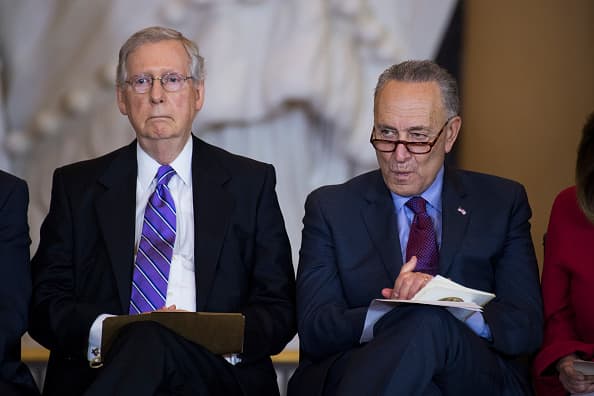Bipartisan lawmakers plan to unveil a coronavirus stimulus package Tuesday after months of congressional inaction on curbing the economic damage from the outbreak.
Sen. Mark Warner, a Virginia Democrat and part of a group in Congress that has discussed a new relief plan, told CNBC the proposal will fall between the $2.2 trillion and $500 billion price tags sought by Democratic and Republican leaders, respectively. He called for an “interim package” to provide support until President-elect Joe Biden takes office in January.
“If there’s one thing I’m hearing uniformly it’s Congress, do not leave town for the holidays leaving the country and the economy adrift with all these initial CARES [Act] programs running out,” Warner told CNBC’s “Squawk Box.”
Senate Minority Leader Charles Schumer, D-N.Y., right, and Senate Majority Leader Mitch McConnell, R-Ky.
Tom Williams | CQ-Roll Call Group | Getty Images
The Washington Post reported the plan would cost $908 billion overall and likely would include a $300 per week enhanced unemployment benefit, $300 billion for Paycheck Protection Program small business loans, $240 billion for state and local governments, a temporary liability shield for businesses and $50 billion for health-care support and vaccine distribution. It would not include a second round of direct payments. The newspaper noted that details were not necessarily final.
It is unclear whether congressional leaders will embrace the proposal or if it will lead to a breakthrough before the end of the year. Democrats have opposed liability protections and pushed for a $600 per week supplemental jobless benefit, while the GOP has pushed against new state and local aid.
The pandemic has rampaged through the country, straining hospitals and forcing state and local officials to implement new restrictions to slow infections. At the same time, lifelines put in place by Congress earlier this year will expire at the end of the year, hitting Americans already struggling to cover costs.
The programs lapsing at the end of December include an unemployment insurance extension, a federal student loan payment moratorium and some protections from eviction.
House Speaker Nancy Pelosi, D-Calif., and Senate Majority Leader Mitch McConnell, R-Ky., have not yielded ground from their $2.2 trillion and $500 billion aid bills, respectively. Leaders of the Democratic-held House and GOP-controlled Senate have not held formal talks on stimulus since the 2020 election on Nov. 3.
During the stalemate, members of both parties have urged compromise to ease some of the pressure on the economy and health-care system. On top of the economic programs, the federal government will likely need to approve funds to streamline distribution of Covid-19 vaccines in the coming months.
This story is developing. Please check back for updates.
— CNBC’s Ylan Mui contributed to this report
